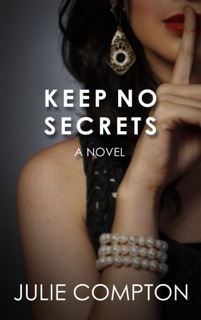This month, Fabulous
Florida Writers is pleased to welcome guest blogger Julie Compton. Julie is the
internationally published author of TELL NO LIES, a legal thriller set in her
original hometown of St. Louis; RESCUING OLIVIA, a romantic, contemporary
thriller set in Florida; and the just released KEEP NO SECRETS, the sequel to
TELL NO LIES. Her novels combine the suspense of thrillers with the drama of
human relationships. Julie was our featured author on February 3, 2012.When I became a published author, I lost my voice.
How can
that be? you might ask. I'd written a book and suddenly it was printed and
bound and packaged prettily and shipped to bookstores across the world. Imagine
how many people would read the words I'd written. Think of all those readers
who would curl up in their favorite chair and dive into a story that once
existed only in my head. No voice? How can I say that?
Let me clarify. I didn't lose my "writer" voice, the one that likes to create stories and put them on paper for others to read. No, that voice grew louder and stronger.
Instead,
I lost my "Julie" voice. The voice that forms a large part of the
woman I am. Anyone who knows me well knows that I am not—excuse the cliché—a
shrinking violet. I didn't go to law school for three years only to keep my
opinions to myself.
But
that's, in effect, what I did after I signed my first book contract with a
traditional publisher. Without even realizing it myself, I began to tamp down
my usually assertive personality. I became a mouse, afraid to speak up about
anything for fear I might offend someone—my publisher, my editor, my agent,
another author, booksellers, librarians, a potential reader, even an existing reader. Heaven forbid someone
might not like what I had to say or got angry with me. I couldn't risk pissing
off any of these people, I thought. I didn't want to be seen as the
"difficult" or "unappreciative" author. The publisher might
not want to publish me again; the agent might not want to represent me. The
other author might not be willing to blurb my book. The bookseller or librarian
won't stock my book, or they might pan it. The reader might not buy any more of
them. I subconsciously censored myself at every turn, all in the name of the
next book contract or a possible book sale.
In
December, after getting the rights back to my first two novels (and after
several years of carefully watching other authors who had taken the leap), I
tested the waters by re-releasing my debut novel, Tell No Lies, through the Kindle Direct Publishing program. In
January, I did the same with my second title, Rescuing Olivia. I had a blast doing it. I learned how to format
e-books, and my daughter, an art student at Savannah College of Art &
Design, designed new covers that rival any I've seen from the big guys.
I was so
thrilled with the results on those backlist titles—titles that until then had
all but disappeared from the radar—that I decided to self-publish my newest
novel, Keep No Secrets, a sequel to Tell No Lies. This decision was the
riskiest—I wouldn't have advance reviews or bookstore distribution or any of
the other few remaining perks of traditional publishing—but I loved the idea of
keeping control over the process.
Keep No Secrets released on March 12. With my
daughter's design assistance, I chose the cover. I picked the format. I decided
the pricing and retain the flexibility to adjust it as I see fit. The novel's success
or failure rests with me, and that's just the way I like it. But most of all,
I've kept my voice.
For more about Julie Compton, visit her website at www.juliecompton.com


